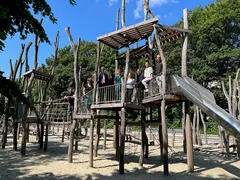Children and young people do not exercise enough! - What was already true in the past has only been exacerbated by technical developments such as cellphones or game consoles. But the situation in the big cities is also visibly worsening for adolescents: population growth, urbanization, and the densification of residential areas are only three indicators of the problem.
The Associate Professorship of Didactics in Sport and Health, in cooperation with the Bavarian State Ministry of Health and Care, is using the "WALKI-MUC" project to investigate the promotion of physical activity offers and "walkability" the ease of movement for children and young people in Munich: "The WALKI-MUC project has shown how much innovation and potential there is in the cooperation between science and urban institutions. From the participating universities (TUM and Munich University of Applied Sciences) to the educational venues and youth facilities to the schools, all project partners have ensured that children and young people can explore their district for themselves from the perspective of physical activity friendliness," explains Prof. Dr. Filip Mess, Head of the Associate Professorship of Didactics in Sport and Health.
For this reason, Prof. Mess and the Research Associates Daniel Scheller and Dr. Joachim Bachner met today, Monday June 12, with representatives of the Ministry at the representative hotspot "Monkey Playground" in Munich's Westend to exchange ideas and to inspect the outdoor play area. Afterwards, there was a discussion with the local education managers from the Department of Education in the Neighbourhood (Department of Education and Sports of the City of Munich) on the topic of "Movement-friendly Munich" in the "Small Hall" of the EineWeltHaus.
The Bavarian Minister of Health, Klaus Holetschek, emphasized: "Exercise and sport are enormously important for healthy development and high quality of life in childhood and adolescence. As part of the Healthy.Life.Bavaria initiative, we support innovative projects such as 'WALKI-MUC' or 'KIJANI' to promote exercise and, thus, the health of children and young people. It's great that in the 'WALKI-MUC project', children and young people can discover exercise-friendly places like playgrounds or green open spaces and actively help shape them. The project's findings, funded by the Bavarian State Ministry of Health and Care, can sustainably improve the physical activity-friendliness for children and young people not only in the neighborhoods in Munich but also throughout Bavaria."
The project aims to use various measures to systematically record, describe and evaluate the walkability of selected neighborhoods in the state capital of Munich (Giesing, Bogenhausen, Riem, Berg am Laim, Schwanthaler Höhe or Neuaubing/Westkreuz) for the first time from the subjective perception of children and young people living in the neighborhoods.
This should make it easier for many children and young people, especially in the selected neighborhoods, to explore their living environment and become more aware of different places for exercise and then actively use them. Thus, health-promoting behaviors such as increasing physical activity among children and young people are to be built up, expanded, and permanently established. The establishment of healthy lifestyles is to be supported.
"Originally, the WALKI-MUC project was intended to assess pedestrian friendliness in Munich from the perspective of children and young people. However, by actively engaging with their immediate living environment, the participants have opened up new perspectives on their neighborhood beyond that. The photo walks have triggered a sense of place and belonging in many of them, which can contribute to promoting health and well-being in the long term," summarizes project manager Daniel Scheller.
For this purpose, 93 children and young people aged six to 17 from six different city districts took part in photo walks, interviews on foot, and mapping exercises to record their perception of movement-friendly places. Almost one hundred places for physical activity were identified by the children - playgrounds and especially outdoor play areas with permanently installed equipment that can be used in various ways for sports, and exercise were prevalent.
Dr. Joachim Bachner, also project manager, emphasizes the importance of the project also for future projects: "In WALKI-MUC, we managed to offer Munich's children and young people a real platform where they could freely express themselves about their neighborhood. In my opinion, the project has model character for lived participation of children and youth in urban space."
The findings from "WALKI-MUC", such as the places presented for exercise opportunities and offers for children and young people in public space, are to be linked with the app developed in an interdisciplinary manner in the "Virtual Health - KIJANI" project (Chair of Preventive Paediatrics, Department of Sport and Health Sciences, and Digital Health Group, TUM Department of Informatics), so that the gamification content (transfer of game elements to a non-game context) of the app is used in meaningful places. The project aims to significantly contribute to research and practice in the interface between health promotion and urban development.
To the homepage of the Associate Professorship of Didactics in Sport and Health
To the project page of WALKI-MUC
Contact:
Prof. Dr. Filip Mess
Associate Professorship of Didactics in Sport and Health
Georg-Brauchle-Ring 60/62
80992 München
phone: 089 289 24520
e-mail: filip.mess(at)tum.de
Daniel Scheller
Associate Professorship of Didactics in Sport and Health
Georg-Brauchle-Ring 60/62
80992 München
phone: 089 289 24796
e-mail: daniel.scheller(at)tum.de
Dr. Joachim Bachner
Associate Professorship of Didactics in Sport and Health
Georg-Brauchle-Ring 60/62
80992 München
phone: 089 289 24514
e-mail: joachim.bachner(at)tum.de
Text: Bastian Daneyko
Photos: Bavarian State Ministry for Health and Care/stmgp/private


